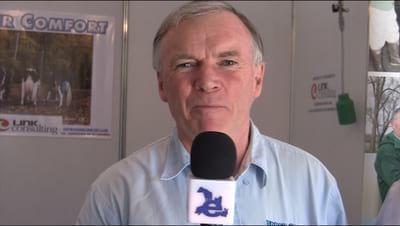Cost of Clinical Mastitis. Dr. V. Cabrera (University of Wisconsin)
Published: May 30, 2013
Related topics:
Authors:

Recommend
Comment
Share
11 de julio de 2013
7/11/2030
In collaboration with Tamil Nadu veterinary & animal science University IHST is conducting a PG Diploma course on Ethnoveterinary Practices(EVP). One of the condition we are giving high priorities is Mastitis. The present Dairy management practices & the high yeilding breeds are reason for high mastitis incidence in India. The average cost of modern veterinary reatment is about Rs. 3500 ( $50 /episode)with 20 -40 percent succees in certain states. The loss of milk and other indirect expenditure are being surveyed now. we may be able to have an estimation by the end of this year. Bur using the EVP the treatment cost can be reduced to Rs.50 ( Less than a dollar) with 95 % efficacy and reduction of milk loss ( production loss)
Nair
Recommend
Reply
3 de junio de 2013
Clinical mastitis & even dry Mastitis can be treated successfully with alternative medicine which are cost effective & efficacious
DR. M N B Nair, Institute of Transdisciplinary health sciences & Technology , Bangalore, India
Recommend
Reply
4 de noviembre de 2016
Acute Mastitis is easily induced and easily treated within 24 - 36 hours. Peracute form of mastitis requires more , time 7 - 9 days . To become pioneer in chemotherapy of bovine mastitis you must know many veterinary branches and all causes of this clinical affection under field conditions.
Recommend
Reply
26 de julio de 2013
Respected sir
my name is Rahil ,we in Kashmir are also finding high prevalence of both clin. & subclin. mastitis. we are generally using therapeutic treatments
to control this problem which not only leads to our financial losses but also resistance to antibiotics. Therefore you are humble requested to send new methods for controlling this problem.
Recommend
Reply


Principles of Conventional & Alternative Therapy in Mastitis: A Comprehensive Review
Suggested link
11 de julio de 2013
Dr Nair Sir,
You may consider to try calves sucking on cow teats as the last operation after milking is complete, as a natural disinfectant treatment for teats and thus avoid need for specially chemical formulations of teat dip solutions and their , expenses. Cows will also feel better by greater contact with their calves.
Recommend
Reply
11 de julio de 2013
India has thousands of years old domesticated cow tradition. In traditional hand milking systems, a calf is allowed to suck on the teats of cow. The saliva of calf provides the natural disinfectant protection of the teats of cow. Cow remain free of mastitis and do not require any special teat dips.
Following is quoted on this topic from wikipedia.
" A common belief is that saliva contained in the mouth has natural disinfectants, which leads people to believe it is beneficial to "lick their wounds". Researchers at the University of Florida at Gainesville have discovered a protein called nerve growth factor (NGF) in the saliva of mice. Wounds doused with NGF healed twice as fast as untreated and un-licked wounds; therefore, saliva can help to heal wound in some species. NGF has not been found in human saliva; however, researchers find human saliva contains such antibacterial agents as secretory IgA, lactoferrin, lysozyme and peroxidase.[6] It has not been shown that human licking of wounds disinfects them, but licking is likely to help clean the wound by removing larger contaminants such as dirt and may help to directly remove infective bodies by brushing them away. Therefore, licking would be a way of wiping off pathogens, useful if clean water is not available to the animal or person.
The mouth of animals is the habitat of many bacteria, some pathogenic. Some diseases, such as herpes, can be transmitted through the mouth. Animal and human bites are routinely treated with systemic antibiotics because of the risk of septicemia."
Recommend
Reply


BOVIMIN – GL
BOVIMIN–GL are Glycine chelated minerals to improve conception rate, Reduces cow open day, Improves pregnancy rate, prevent Masitis, all in dairy cattle
Suggested link

Would you like to discuss another topic? Create a new post to engage with experts in the community.







.jpg&w=3840&q=75)
.jpg&w=3840&q=75)




